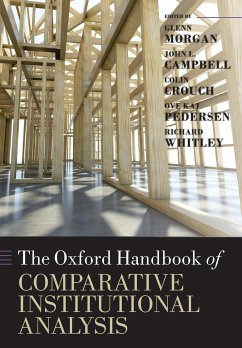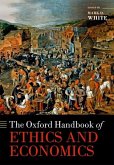- Broschiertes Buch
- Merkliste
- Auf die Merkliste
- Bewerten Bewerten
- Teilen
- Produkt teilen
- Produkterinnerung
- Produkterinnerung
It is increasingly accepted that 'institutions matter' for economic organization and outcomes. This Handbook explores the issues, perspectives, and models concerned with comparative institutional analysis. The leading scholars in the area contribute chapters to provide a central reference point for academics, scholars, and students.
Andere Kunden interessierten sich auch für
![The Oxford Handbook of Economic Inequality The Oxford Handbook of Economic Inequality]() The Oxford Handbook of Economic Inequality64,99 €
The Oxford Handbook of Economic Inequality64,99 €![The Oxford Handbook of Latin American Economics The Oxford Handbook of Latin American Economics]() The Oxford Handbook of Latin American Economics211,99 €
The Oxford Handbook of Latin American Economics211,99 €![Comparative Approaches to Old and New Institutional Economics Comparative Approaches to Old and New Institutional Economics]() Comparative Approaches to Old and New Institutional Economics277,99 €
Comparative Approaches to Old and New Institutional Economics277,99 €![The Oxford Handbook of Ethics and Economics The Oxford Handbook of Ethics and Economics]() The Oxford Handbook of Ethics and Economics217,99 €
The Oxford Handbook of Ethics and Economics217,99 €![Varieties of Capitalism (the Institutional Foundations of Comparative Advantage) Varieties of Capitalism (the Institutional Foundations of Comparative Advantage)]() Peter A. Hall / David Soskice (eds.)Varieties of Capitalism (the Institutional Foundations of Comparative Advantage)297,99 €
Peter A. Hall / David Soskice (eds.)Varieties of Capitalism (the Institutional Foundations of Comparative Advantage)297,99 €![Oxford Handbook of Christianity and Economics Oxford Handbook of Christianity and Economics]() Oxford Handbook of Christianity and Economics230,99 €
Oxford Handbook of Christianity and Economics230,99 €![The Palgrave Companion to Oxford Economics The Palgrave Companion to Oxford Economics]() The Palgrave Companion to Oxford Economics171,99 €
The Palgrave Companion to Oxford Economics171,99 €-
-
-
It is increasingly accepted that 'institutions matter' for economic organization and outcomes. This Handbook explores the issues, perspectives, and models concerned with comparative institutional analysis. The leading scholars in the area contribute chapters to provide a central reference point for academics, scholars, and students.
Hinweis: Dieser Artikel kann nur an eine deutsche Lieferadresse ausgeliefert werden.
Hinweis: Dieser Artikel kann nur an eine deutsche Lieferadresse ausgeliefert werden.
Produktdetails
- Produktdetails
- Verlag: Oxford University Press(UK)
- Seitenzahl: 724
- Erscheinungstermin: 16. Juli 2013
- Englisch
- Abmessung: 244mm x 170mm x 39mm
- Gewicht: 1227g
- ISBN-13: 9780199693771
- ISBN-10: 0199693773
- Artikelnr.: 34003637
- Herstellerkennzeichnung
- Libri GmbH
- Europaallee 1
- 36244 Bad Hersfeld
- gpsr@libri.de
- Verlag: Oxford University Press(UK)
- Seitenzahl: 724
- Erscheinungstermin: 16. Juli 2013
- Englisch
- Abmessung: 244mm x 170mm x 39mm
- Gewicht: 1227g
- ISBN-13: 9780199693771
- ISBN-10: 0199693773
- Artikelnr.: 34003637
- Herstellerkennzeichnung
- Libri GmbH
- Europaallee 1
- 36244 Bad Hersfeld
- gpsr@libri.de
Glenn Morgan is Professor of International Management, Cardiff Business School, Cardiff University. John Campbell is Class of 1925 Professor, Department of Sociology, at Dartmouth College. Colin Crouch is a professor at the Warwick Business School, University of Warwick. Ove Kaj Pedersen is a professor at the International Centre for Business and Politics, Copenhagen Business School. Richard Whitley is professor at the Manchester Business School, University of Manchester.
* Introduction
* Part I: Theories and Methods in Comparative Institutional Analysis
* 1: Marie-Laure Djelic: Institutional Perspectives - Working towards
Coherence or Irreconcilable Diversity?
* 2: Kathleen Thelen: Beyond Comparative Statics: Historical
Institutional Approaches to Stability and Change In the Political
Economy of Labor
* 3: Gregory Jackson: Actors and Institutions
* 4: John L. Campbell: Institutional Reproduction and Change
* 5: Colin Crouch: Complementarity
* 6: Bruce Kogut: Qualitative Comparative Analysis of Social Science
Data
* Part II: Institutions, States, and Markets
* 7: Linda Weiss: The State in the Economy: Neoliberal or Neoactivist?
* 8: Glenn Morgan: Money and Markets
* 9: Leonard Seabrooke: Transnational Institutions and International
Regimes
* 10: Glenn Morgan and Sigrid Quack: Law as a Governing Institution
* 11: Richard Deeg: Institutional Change in Financial Systems
* 12: Steven Casper: The Comparative Institutional Analysis of
Innovation: From Industrial Policy to the Knowledge Economy
* 13: Richard Whitley: Changing Competition Models in Market Economies:
The Effects of Internationalization, Technological Innovations, and
Academic Expansion on the Conditions Supporting Dominant Economic
Logics
* 14: Lane Kenworthy: Institutions, Wealth, and Inequality
* Part III: The Organization of Economic Actors
* 15: Michel Goyer: Corporate Governance
* 16: Richard Whitley: The Institutional Construction of Firms
* 17: Jill Rubery: Institutionalizing the Employment Relationship
* 18: Gary Herrigel and Jonathan Zeitlin: Inter-Firm Relations in
Global Manufacturing: Disintegrated Production and Its Globalization
* Part IV: Challenges for Comparative Institutional Analysis
* 19: Ivan Szelenyi and Katarzyna Wilk: Institutional transformation in
European Post-Communist Regimes
* 20: John A. Hall: State Failure
* 21: Ewald Engelen and Martijn Konings: Financial Capitalism
Resurgent: Comparative Institutionalism and the Challenges of
Financialization
* 22: Ove Kaj Pedersen: Institutional Competitiveness: How Nations Came
to Compete
* 23: Wolfgang Streeck: Institutions in History: Bringing Capitalism
Back In
* Part I: Theories and Methods in Comparative Institutional Analysis
* 1: Marie-Laure Djelic: Institutional Perspectives - Working towards
Coherence or Irreconcilable Diversity?
* 2: Kathleen Thelen: Beyond Comparative Statics: Historical
Institutional Approaches to Stability and Change In the Political
Economy of Labor
* 3: Gregory Jackson: Actors and Institutions
* 4: John L. Campbell: Institutional Reproduction and Change
* 5: Colin Crouch: Complementarity
* 6: Bruce Kogut: Qualitative Comparative Analysis of Social Science
Data
* Part II: Institutions, States, and Markets
* 7: Linda Weiss: The State in the Economy: Neoliberal or Neoactivist?
* 8: Glenn Morgan: Money and Markets
* 9: Leonard Seabrooke: Transnational Institutions and International
Regimes
* 10: Glenn Morgan and Sigrid Quack: Law as a Governing Institution
* 11: Richard Deeg: Institutional Change in Financial Systems
* 12: Steven Casper: The Comparative Institutional Analysis of
Innovation: From Industrial Policy to the Knowledge Economy
* 13: Richard Whitley: Changing Competition Models in Market Economies:
The Effects of Internationalization, Technological Innovations, and
Academic Expansion on the Conditions Supporting Dominant Economic
Logics
* 14: Lane Kenworthy: Institutions, Wealth, and Inequality
* Part III: The Organization of Economic Actors
* 15: Michel Goyer: Corporate Governance
* 16: Richard Whitley: The Institutional Construction of Firms
* 17: Jill Rubery: Institutionalizing the Employment Relationship
* 18: Gary Herrigel and Jonathan Zeitlin: Inter-Firm Relations in
Global Manufacturing: Disintegrated Production and Its Globalization
* Part IV: Challenges for Comparative Institutional Analysis
* 19: Ivan Szelenyi and Katarzyna Wilk: Institutional transformation in
European Post-Communist Regimes
* 20: John A. Hall: State Failure
* 21: Ewald Engelen and Martijn Konings: Financial Capitalism
Resurgent: Comparative Institutionalism and the Challenges of
Financialization
* 22: Ove Kaj Pedersen: Institutional Competitiveness: How Nations Came
to Compete
* 23: Wolfgang Streeck: Institutions in History: Bringing Capitalism
Back In
* Introduction
* Part I: Theories and Methods in Comparative Institutional Analysis
* 1: Marie-Laure Djelic: Institutional Perspectives - Working towards
Coherence or Irreconcilable Diversity?
* 2: Kathleen Thelen: Beyond Comparative Statics: Historical
Institutional Approaches to Stability and Change In the Political
Economy of Labor
* 3: Gregory Jackson: Actors and Institutions
* 4: John L. Campbell: Institutional Reproduction and Change
* 5: Colin Crouch: Complementarity
* 6: Bruce Kogut: Qualitative Comparative Analysis of Social Science
Data
* Part II: Institutions, States, and Markets
* 7: Linda Weiss: The State in the Economy: Neoliberal or Neoactivist?
* 8: Glenn Morgan: Money and Markets
* 9: Leonard Seabrooke: Transnational Institutions and International
Regimes
* 10: Glenn Morgan and Sigrid Quack: Law as a Governing Institution
* 11: Richard Deeg: Institutional Change in Financial Systems
* 12: Steven Casper: The Comparative Institutional Analysis of
Innovation: From Industrial Policy to the Knowledge Economy
* 13: Richard Whitley: Changing Competition Models in Market Economies:
The Effects of Internationalization, Technological Innovations, and
Academic Expansion on the Conditions Supporting Dominant Economic
Logics
* 14: Lane Kenworthy: Institutions, Wealth, and Inequality
* Part III: The Organization of Economic Actors
* 15: Michel Goyer: Corporate Governance
* 16: Richard Whitley: The Institutional Construction of Firms
* 17: Jill Rubery: Institutionalizing the Employment Relationship
* 18: Gary Herrigel and Jonathan Zeitlin: Inter-Firm Relations in
Global Manufacturing: Disintegrated Production and Its Globalization
* Part IV: Challenges for Comparative Institutional Analysis
* 19: Ivan Szelenyi and Katarzyna Wilk: Institutional transformation in
European Post-Communist Regimes
* 20: John A. Hall: State Failure
* 21: Ewald Engelen and Martijn Konings: Financial Capitalism
Resurgent: Comparative Institutionalism and the Challenges of
Financialization
* 22: Ove Kaj Pedersen: Institutional Competitiveness: How Nations Came
to Compete
* 23: Wolfgang Streeck: Institutions in History: Bringing Capitalism
Back In
* Part I: Theories and Methods in Comparative Institutional Analysis
* 1: Marie-Laure Djelic: Institutional Perspectives - Working towards
Coherence or Irreconcilable Diversity?
* 2: Kathleen Thelen: Beyond Comparative Statics: Historical
Institutional Approaches to Stability and Change In the Political
Economy of Labor
* 3: Gregory Jackson: Actors and Institutions
* 4: John L. Campbell: Institutional Reproduction and Change
* 5: Colin Crouch: Complementarity
* 6: Bruce Kogut: Qualitative Comparative Analysis of Social Science
Data
* Part II: Institutions, States, and Markets
* 7: Linda Weiss: The State in the Economy: Neoliberal or Neoactivist?
* 8: Glenn Morgan: Money and Markets
* 9: Leonard Seabrooke: Transnational Institutions and International
Regimes
* 10: Glenn Morgan and Sigrid Quack: Law as a Governing Institution
* 11: Richard Deeg: Institutional Change in Financial Systems
* 12: Steven Casper: The Comparative Institutional Analysis of
Innovation: From Industrial Policy to the Knowledge Economy
* 13: Richard Whitley: Changing Competition Models in Market Economies:
The Effects of Internationalization, Technological Innovations, and
Academic Expansion on the Conditions Supporting Dominant Economic
Logics
* 14: Lane Kenworthy: Institutions, Wealth, and Inequality
* Part III: The Organization of Economic Actors
* 15: Michel Goyer: Corporate Governance
* 16: Richard Whitley: The Institutional Construction of Firms
* 17: Jill Rubery: Institutionalizing the Employment Relationship
* 18: Gary Herrigel and Jonathan Zeitlin: Inter-Firm Relations in
Global Manufacturing: Disintegrated Production and Its Globalization
* Part IV: Challenges for Comparative Institutional Analysis
* 19: Ivan Szelenyi and Katarzyna Wilk: Institutional transformation in
European Post-Communist Regimes
* 20: John A. Hall: State Failure
* 21: Ewald Engelen and Martijn Konings: Financial Capitalism
Resurgent: Comparative Institutionalism and the Challenges of
Financialization
* 22: Ove Kaj Pedersen: Institutional Competitiveness: How Nations Came
to Compete
* 23: Wolfgang Streeck: Institutions in History: Bringing Capitalism
Back In








